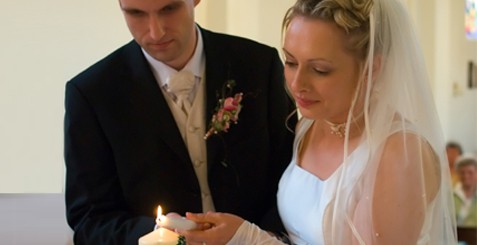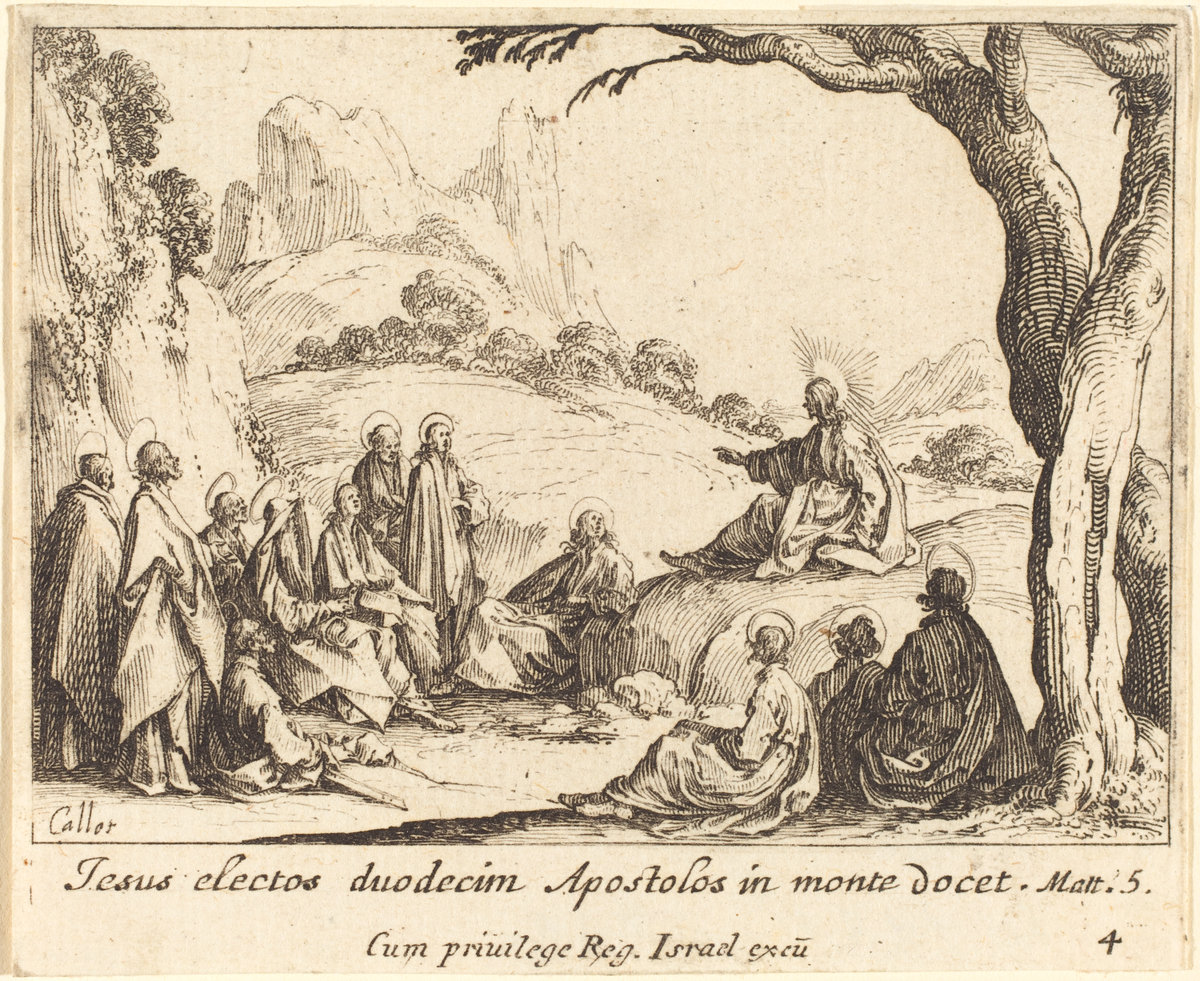The Beatitudes, Marriage, and Family (Part 9 of 9)
Blessed are those who are persecuted for righteousness’ sake, for theirs is the kingdom of heaven. Blessed are you when men revile you and persecute you and utter all kinds of evil against you falsely on my account. Rejoice and be glad, for your reward is great in heaven, for so men persecuted the prophets who were before you. (Mt 5:10-12)
He includes those in the beatitude whose will is ready to suffer all things for Christ, who is our righteousness. For these then also is the kingdom preserved, for they are in the contempt of this world poor in spirit. (St. Hilary of Poitiers)
It may seem to be extreme, for us who work to uphold the true meaning of marriage to think of ourselves as “persecuted,” especially in the sense that we say the early Christians were persecuted. And indeed, playing the martyr does not get one very far with those whom one perceives to be doing the persecuting. Even if there is some element of truth in it, it’s a dangerous and tricky thing to speak and behave as if one is the victim of vicious persecution.
This claim needs to be carefully articulated: it’s certainly the case that religious liberty is being superseded in various ways today in the name of equality and fairness and “civil rights”—and people on both sides of the marriage debate have readily acknowledged this fact. But the early Christians were put to death for confessing their faith in Jesus Christ. This is a different sort of thing than experiencing various forms of social injustice which are certainly wrong but are also non-lethal.
But the comparison, careful as we must be in making it, is not totally devoid of value. It’s not helpful to portray ourselves as living martyrs in response to the many trials Christians have undergone, are undergoing, and will undergo because of various government infractions or in response to the attempt to change the very definition of the fundamental institution which is the heart and foundation of the family, the “basic cell of society” (as St. John Paul II often called it); but it is helpful to see how the early Christians lived even in the midst of their own persecutions.
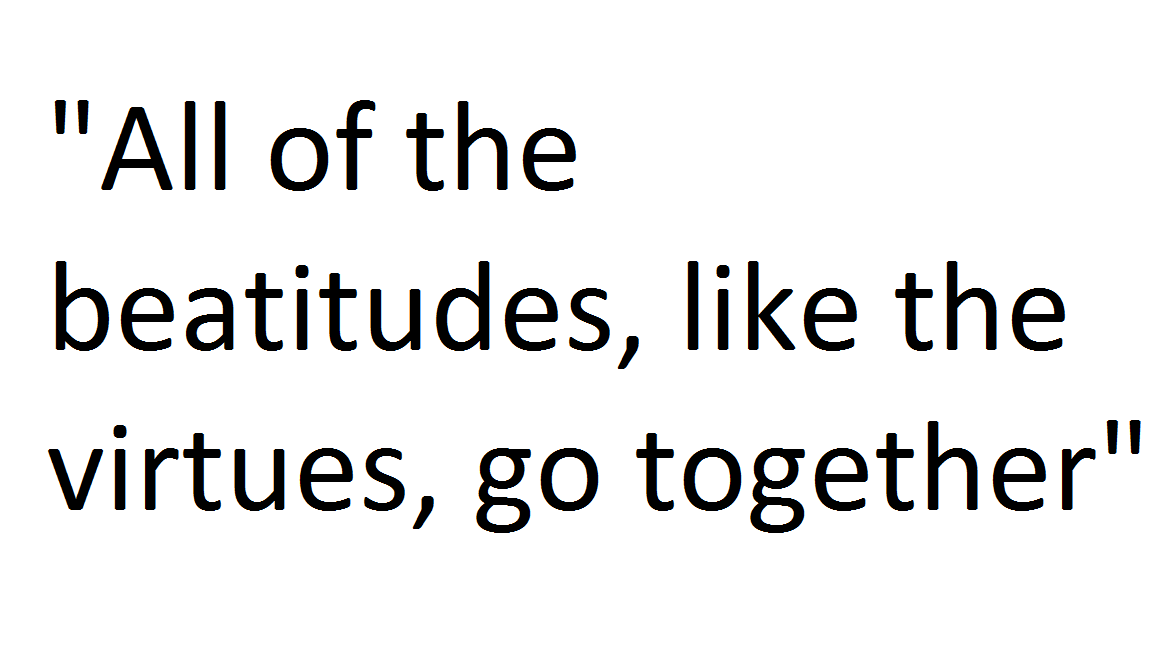 Our Christian tradition is full of inspiring stories of holy patience in the face of intense persecution and suffering, of courageous martyrdom, and even of humor. (St. Lawrence, burned alive on a grill in 258, famously quipped as he was tortured, “You may turn me over, I’m done on this side.”) But St. Hilary of Poitiers, who died in 368 and thus knew well the gruesome details of the persecutions inflicted on the Christians who went before him, beautifully sums up the attitude of those who are persecuted for the sake of righteousness: they are “poor in spirit.” By referring this last beatitude back to the first, he implies that all of the beatitudes, like the virtues, go together: where one is found, the others may be found too. The early Christians were able to submit to persecution and even to martyrdom, and survive it, thanks to the grace of God which enabled them to live according to the Beatitudes, to live lives completely oriented towards God.
Our Christian tradition is full of inspiring stories of holy patience in the face of intense persecution and suffering, of courageous martyrdom, and even of humor. (St. Lawrence, burned alive on a grill in 258, famously quipped as he was tortured, “You may turn me over, I’m done on this side.”) But St. Hilary of Poitiers, who died in 368 and thus knew well the gruesome details of the persecutions inflicted on the Christians who went before him, beautifully sums up the attitude of those who are persecuted for the sake of righteousness: they are “poor in spirit.” By referring this last beatitude back to the first, he implies that all of the beatitudes, like the virtues, go together: where one is found, the others may be found too. The early Christians were able to submit to persecution and even to martyrdom, and survive it, thanks to the grace of God which enabled them to live according to the Beatitudes, to live lives completely oriented towards God.
For us, then, who are not being nailed to crosses, burned alive, stoned to death, beheaded, shot full of arrows, skinned alive, or hacked to death, but who do endure various difficulties and trials of our own for upholding the truth about marriage—and for those in our midst who themselves experience same-sex attractions and struggle to approach Christian perfection through the chastity to which they are called—the early Christians can serve as models: since we are surrounded by so great a cloud of witnesses, let us also lay aside every weight, and sin which clings so closely, and let us run with perseverance the race that is set before us, looking to Jesus the pioneer and perfecter of our faith, who for the joy that was set before him endured the cross, despising the shame, and is seated at the right hand of the throne of God. (Heb 12:1-2)
~
This series is a guest contribution by a Dominican student brother who has been fulfilling his pastoral ministry assignment by serving as an intern at the USCCB’s Secretariat for Laity, Marriage, Family Life, and Youth.
Archive
The Beatitudes, Marriage, and Family (Part 8 of 9)
Blessed are the peacemakers, for they shall be called sons of God. (Mt 5:9)
The blessedness of the peacemakers is the reward of adoption, “they shall be called the sons of God.” For God is our common parent, and no other way can we pass into His family than by living in brotherly love together. (St. Hilary of Poitiers)
The implication here is clear: those who make peace will be called sons of God, and those who don’t, won’t. But it’s worth asking, what is meant by “peace” here? In what does this peace consist?
In his book on the Beatitudes, the Dominican theologian Servais Pinckaers considers the various meanings of peace in the Bible and then distinguishes two different kinds of peace, cowardly peace and noble peace:
Cowardly peace is filled with fear. It avoids struggle and danger and shows lassitude in the face of effort and commitment. It is external and is established by means of concession, evasion, and compromise. It is peace at any price, without moral cost. The man of cowardly peace is incapable of simply saying yes or no, taking a clear stand and sticking to it, and assuming responsibility to the end. Under the pretext of dialogue, and for lack of courage, he always delays his decisions.
Pinckaers uses fairly strong words here, but his point remains: this kind of peace is called peace in the same way that simply not hating someone is called love. It simply doesn’t convey what the full meaning of the word is meant to convey. About the other kind of peace, noble peace, he writes:
What I call a noble peace is that high ideal which gives meaning and richness to human life. It calls for personal commitment and a clear response to the appeal of truth, justice, and generous love. In contrast with the false prophets of facile spontaneity and endless dialogue, the man of noble peace does not draw back from renunciations and sacrifices. He has been touched interiorly by the strong and sweet ray of a new peace which draws him to the heights and gathers his energies together to sustain him in the upward climb. This peace exists in us, therefore, and above us. It is a peace more powerful than the forces of war which stir in our hearts and in the world. It is a rich peace, invigorating us and rewarding all our efforts.
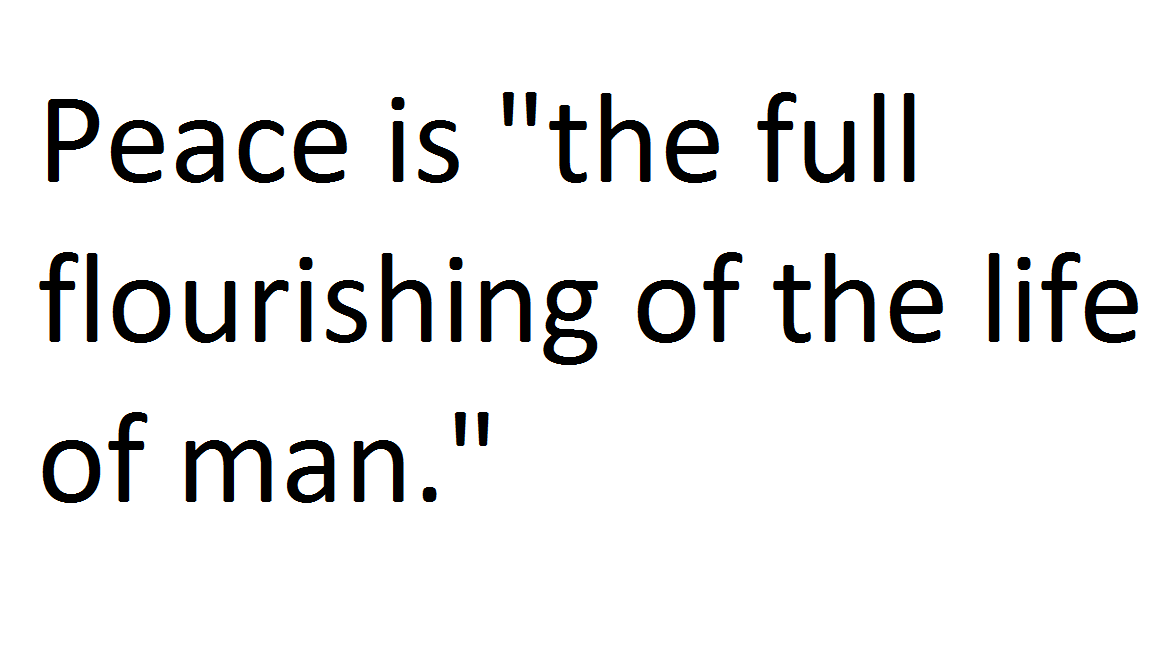 This, Pinckaers says, is the true Scriptural sense of what peace is. When we pray for peace on earth, what we often mean is the mere absence of unnecessary violence—a good thing, to be sure; but what we ought to mean is this notion of full flourishing of the life of man.
This, Pinckaers says, is the true Scriptural sense of what peace is. When we pray for peace on earth, what we often mean is the mere absence of unnecessary violence—a good thing, to be sure; but what we ought to mean is this notion of full flourishing of the life of man.
This peace should pervade our whole lives, including our dealings with those who disagree even vehemently. Clearly, noble peace belongs to the virtuous man. Those who live with and strive for noble peace (and emphatically not those who tend merely to cowardly peace) seem to be the ones who will be called children of God.
St. Hilary’s insight above is moving, and true: we pass into God’s family by living in brotherly love together. This must not be taken to exclude those who disagree with us. We come yet again to the Gospel notion of charity towards all, loving God in our fellow man.
* The quotes above are taken from Servais Pinckaers, O.P., The Pursuit of Happiness—God’s Way: Living the Beatitudes, trans. Sr. Mary Thomas Noble, O.P. (Eugene: Wipf and Stock Publishers, 2011), 156-57.
~
This series is a guest contribution by a Dominican student brother who has been fulfilling his pastoral ministry assignment by serving as an intern at the USCCB’s Secretariat for Laity, Marriage, Family Life, and Youth.
Archive
The Beatitudes, Marriage, and Family (Part 7 of 9)
Blessed are the pure in heart, for they shall see God. (Mt 5:8)
This seeing God is the reward of faith; to which end our hearts are made pure by faith. (St. Augustine)
St. Augustine connects this beatitude with the virtue of faith. This may at first seem odd until we think of the connection between faith and sight: Pope Francis began his first encyclical by writing that those “who believe, see; they see with a light that illumines their entire journey, for it comes from the risen Christ, the morning star which never sets” (Lumen Fidei 1); St. Paul writes that we walk by faith, not by sight (2 Cor 5:7); before raising Lazarus, Jesus tells Martha, “if you would believe you would see the glory of God” (Jn 11:40).
The link, then, between purity of heart and the sight of God, is faith. As Catholics, we believe that faith in God implies faith in the Church and in her teachings; this raises some important questions: How can we understand the phenomenon of Catholics who support the notion of marriage between two persons of the same sex, and how can we respond to those who say, “Well, I’m Catholic, and I think it’s fine”?
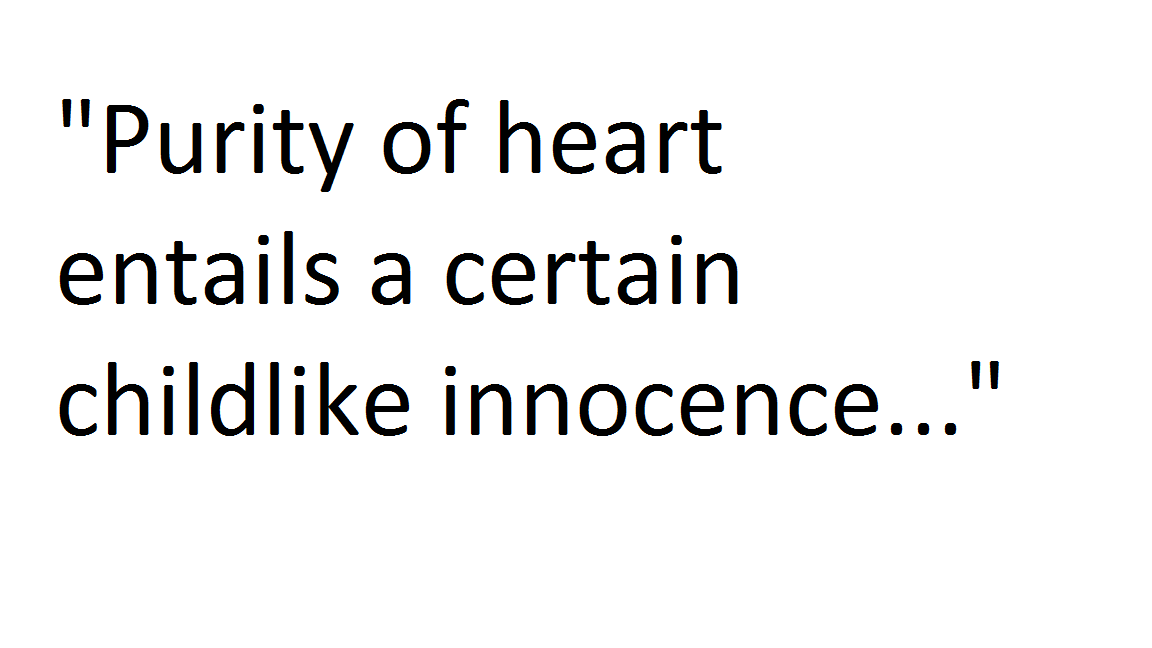 It’s important not to make a judgment about the state of anyone else’s relationship with God. (This is actually what Pope Francis meant when he famously said, “If a person is gay and seeks the Lord and has good will, who am I to judge him?”—it’s not for us to determine whether someone does or doesn’t have a thriving relationship with God.) Purity of heart entails a certain childlike innocence; we should therefore, like children, assume the good intentions of our fellow man. We would do well to abide by the words of St. Paul in this regard: the aim of our charge is love that issues from a pure heart and a good conscience and sincere faith (1 Tim 1:5).
It’s important not to make a judgment about the state of anyone else’s relationship with God. (This is actually what Pope Francis meant when he famously said, “If a person is gay and seeks the Lord and has good will, who am I to judge him?”—it’s not for us to determine whether someone does or doesn’t have a thriving relationship with God.) Purity of heart entails a certain childlike innocence; we should therefore, like children, assume the good intentions of our fellow man. We would do well to abide by the words of St. Paul in this regard: the aim of our charge is love that issues from a pure heart and a good conscience and sincere faith (1 Tim 1:5).
But perhaps this seems somewhat unsatisfactory. And perhaps it should; for this is not the end of the story. We ought not convince ourselves or others that a Catholic who supports the notion of marriage between two persons of the same sex is a belligerent rebel who has no regard for beauty, truth, or goodness and who certainly does not know the Father in any meaningful way. But we also ought not sit idly by while our brother or sister in Christ continues in his/her ignorance of the fullness of the Gospel and of the Church’s beautiful and robust teaching about the nature and goodness of marriage; one of the seven spiritual works of mercy is to instruct the ignorant (and “ignorance” here doesn’t mean a willful act of ignoring something, it just means a lack of knowledge). This work of instruction, just as everything else in our lives, must be done in all charity.
How do we go about this instruction? First of all, with a pure heart and a good conscience and sincere faith. But what about more concrete ways? Arguments strictly from authority, e.g., “So-and-so says so, so it’s so”, are rarely effective, even if they’re true. We can also argue directly from divine revelation, but it may be that even some of our fellow Catholics may be resistant to such arguments. But with this particular issue (and many others) we can also argue simply from reason, in this case from human nature. But we should at the same time be attentive to the fact that arguments from reason alone regarding matters that have also been revealed aren’t always effective either. For example, St. Thomas Aquinas provides five logically solid demonstrations from reason alone for the existence of God, the famous “Five Ways”—yet there are many who follow the logic of the arguments to the conclusion that God exists and still don’t go to church.
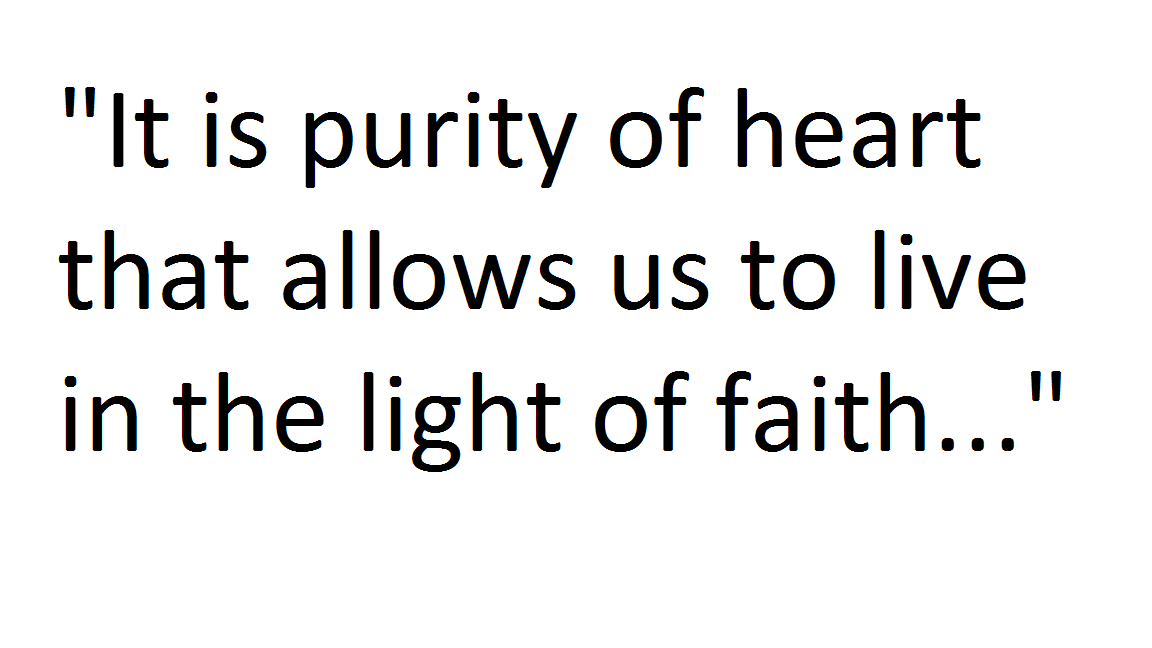 This is one way in which we can see that faith and reason work together: arguments from revelation alone can come across as unfounded dogmatic assertions, while arguments from reason alone can fail to effect a discernable change in the lives of those with whom we speak. When we begin to see that faith and reason each influence each other, it becomes clear that they are “like two wings on which the human spirit rises to the contemplation of truth; and God has placed in the human heart a desire to know the truth—in a word, to know himself—so that, by knowing and loving God, men and women may also come to the fullness of truth about themselves” (St. John Paul II, Fides et Ratio, introduction). It is purity of heart that allows us to live in the light of faith, unencumbered by the darkness of error and sin; let us pray that we and all of our brothers and sisters in the Lord may come to the full knowledge of the truth, which saves us and sets us free.
This is one way in which we can see that faith and reason work together: arguments from revelation alone can come across as unfounded dogmatic assertions, while arguments from reason alone can fail to effect a discernable change in the lives of those with whom we speak. When we begin to see that faith and reason each influence each other, it becomes clear that they are “like two wings on which the human spirit rises to the contemplation of truth; and God has placed in the human heart a desire to know the truth—in a word, to know himself—so that, by knowing and loving God, men and women may also come to the fullness of truth about themselves” (St. John Paul II, Fides et Ratio, introduction). It is purity of heart that allows us to live in the light of faith, unencumbered by the darkness of error and sin; let us pray that we and all of our brothers and sisters in the Lord may come to the full knowledge of the truth, which saves us and sets us free.
~
This series is a guest contribution by a Dominican student brother who has been fulfilling his pastoral ministry assignment by serving as an intern at the USCCB’s Secretariat for Laity, Marriage, Family Life, and Youth.
Archive
The Beatitudes, Marriage, and Family (Part 6 of 9)
Blessed are the merciful, for they shall obtain mercy. (Mt 5:7)
The reward here seems at first to be only an equal return; but indeed it is much more; for human mercy and divine mercy are not to be put on an equality. (St. John Chrysostom)
“Mercy me!” What are people getting at with this exclamation? Like many of the strange utterances of the English language, it speaks to a certain aspect of our human experience, namely, that we need mercy. Not everyone recognizes this truth, but its truth is for everyone. What “Mercy me!” really says is, “Goodness gracious, I need mercy, so have mercy on me, and soon!” We can see the same sense of urgency in the Psalms: Be pleased, O Lord, to rescue me; / Lord, make haste to help me. . . . You are my rescuer, my help; / O my God, do not delay (Ps 40:14, 18).
So we all need to be shown mercy. But it’s a two-way street: we also need to show mercy to others. After all, our Lord taught us to pray, Forgive us our trespasses as we forgive those who trespass against us. But showing mercy to others can be hard, especially when the recipients of our mercy don’t think they need it. Of course, this doesn’t remove our responsibility to show them mercy; it just makes it more difficult.
 Everyone knows that the debates concerning the nature and scope and even value of marriage can be fierce. Many who promote and defend marriage have experienced criticism and even scorn from those who disagree. This is often felt in merely minor ways, but it can also be overwhelming and upsetting, especially when not the message but the speaker is attacked. Yet even here, mercy is necessary. It can seem a strange thing, to forgive someone who not only has not asked for forgiveness but who even thinks he has done nothing wrong. But we’re called to a mercy which doesn’t wait for a proof of remorse.
Everyone knows that the debates concerning the nature and scope and even value of marriage can be fierce. Many who promote and defend marriage have experienced criticism and even scorn from those who disagree. This is often felt in merely minor ways, but it can also be overwhelming and upsetting, especially when not the message but the speaker is attacked. Yet even here, mercy is necessary. It can seem a strange thing, to forgive someone who not only has not asked for forgiveness but who even thinks he has done nothing wrong. But we’re called to a mercy which doesn’t wait for a proof of remorse.
In order to have mercy on others, we must recognize our own need for mercy. Far from haughtily imploring mercy for others, which can quickly turn into the arrogant prayer of the Pharisee, forgetting about mercy and only praising one’s own good qualities (cf. Lk 18:9-14), we are instead called to pray that the mercy shown to us be extended to our neighbors as well. St. Augustine beautifully describes the encounter with mercy when he recounts the forgiveness of the woman caught in adultery: Relicti sunt duo: misera et misericordia; “Two were left: the miserable one and mercy.” We ourselves are these miserable ones, these sinners who are utterly lost without the one who is mercy itself. The mercy we are called to implore for others is the same mercy we are called to implore for ourselves. And there is a transformative quality to this divine mercy: when God forgives, much more than when we forgive, lives and hearts are changed. In the work of promoting and defending marriage, this is what we are called to pray for: that God may have mercy on us, and extend that mercy to those who perhaps have not yet sought it; that hearts, both theirs and ours, may be changed.
~
This series is a guest contribution by a Dominican student brother who has been fulfilling his pastoral ministry assignment by serving as an intern at the USCCB’s Secretariat for Laity, Marriage, Family Life, and Youth.
Archive
The Beatitudes, Marriage, and Family (Part 5 of 9)
Blessed are those who hunger and thirst for righteousness, for they shall be satisfied. (Mt 5:6)
It is not enough that we desire righteousness, unless we also suffer hunger for it, by which expression we may understand that we are never righteous enough, but always hunger after works of righteousness. (St. Jerome)
It’s striking that our Lord uses such bodily imagery to describe the desire for righteousness here—hunger and thirst are decidedly physical phenomena, often characterized by grumbling of the stomach or dryness of the throat, whereas righteousness is less obviously physical. But as St. Jerome (d. 420) points out, it’s one thing to merely desire something; it’s quite another to hunger for it, to thirst for it. The physicality of Jesus’ language here intensifies his meaning. And indeed, if it simply read, “Blessed are those who want righteousness, for they shall eventually get it,” something of its meaning would be lost.
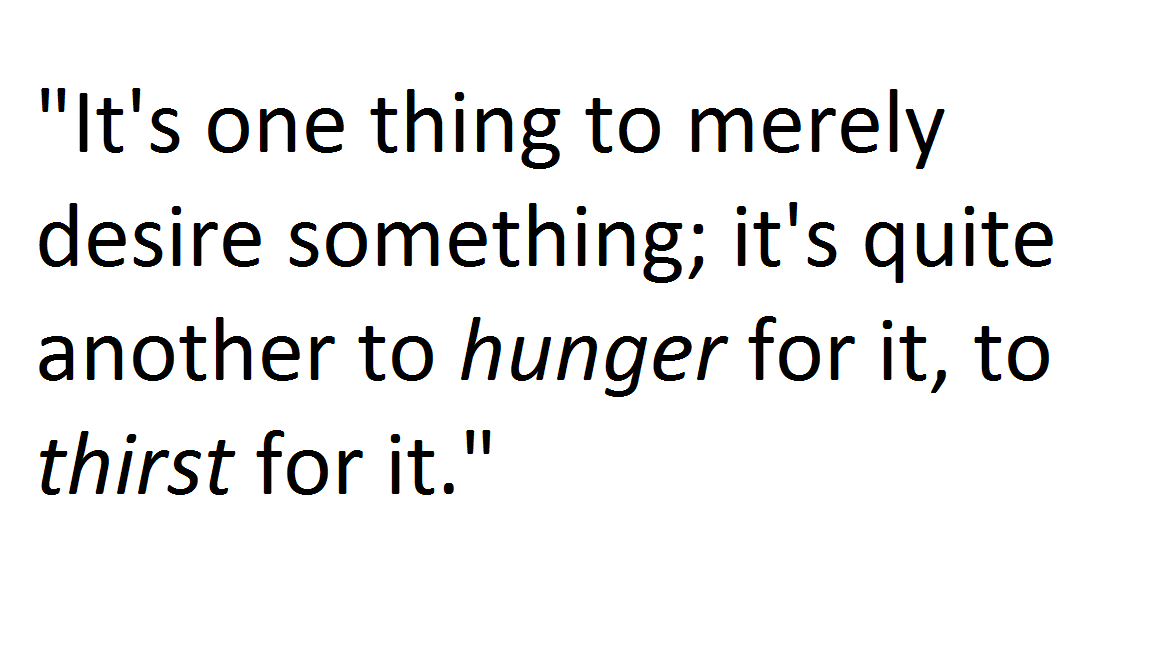 Now, when our Lord talks about hungering and thirsting for righteousness, he is of course speaking metaphorically: righteousness isn’t something we can chew on or sip, eat or drink. But there is a deeper meaning to his words. Again, it’s significant that Jesus should resort to physical imagery, that we should hear these kinds of words from our Lord’s lips. After all, that God could even have lips—that the immaterial Word of God would become man, assuming a human nature and therefore a material human body—is astonishing. Jesus himself, having become a man like us in all things but sin, experienced hunger and thirst like us. By using this kind of language he invites us to hunger for righteousness as if starving and to make righteousness our sustenance.
Now, when our Lord talks about hungering and thirsting for righteousness, he is of course speaking metaphorically: righteousness isn’t something we can chew on or sip, eat or drink. But there is a deeper meaning to his words. Again, it’s significant that Jesus should resort to physical imagery, that we should hear these kinds of words from our Lord’s lips. After all, that God could even have lips—that the immaterial Word of God would become man, assuming a human nature and therefore a material human body—is astonishing. Jesus himself, having become a man like us in all things but sin, experienced hunger and thirst like us. By using this kind of language he invites us to hunger for righteousness as if starving and to make righteousness our sustenance.
Another reason the physical imagery is important is the fact that there is a real physicality to our faith. In addition to the Incarnation, we also have sacramentals, which can dispose us to receive the grace of the sacraments (cf. CCC 1667-79), and we also speak of the corporal works of mercy. As the Second Vatican Council told us, “There is scarcely any proper use of material things which cannot be . . . directed toward the sanctification of men and the praise of God” (Sacrosanctum Concilium 61).
There’s also a real physicality to the sacraments, including marriage. The exchange of consent is spoken and later fulfilled or consummated when the two become one flesh (cf. CCC 1626-27). Rings are also exchanged and worn as a sign of the sacred bond between husband and wife. The highest physical expression of love, the conjugal act, finds its proper place only in marriage. Real-life physical children are born as a crowning gift of marriage and are a lasting reminder of the love shared between husband and wife (but not merely that, of course).
These physical expressions of the love and unbreakable commitment between husband and wife are signs of a deeper spiritual love: the physical represents the spiritual. So too with hungering and thirsting for righteousness. The images of physical hunger and thirst represent the reality of spiritual desire. And righteousness can be understood as personal righteousness or as societal righteousness—both are contained here. We hunger and thirst for holiness for ourselves and for our society; and holy marriages contribute to both.
St. Augustine, who famously connected the Beatitudes with the seven gifts of the Holy Spirit, said that it’s particularly the gift of courage that corresponds to hungering and thirsting for righteousness. Truly hungering and thirsting for righteousness is not a walk in the park (and as it happens, neither is marriage, as any married person could attest). It takes courage truly to live according to the knowledge that “we are never righteous enough, but always hunger after works of righteousness,” as St. Jerome tells us. God’s grace enables us to live with this courage, with this continuous hunger and thirst, that we may seek first his kingdom and his righteousness (Mt 6:33), which desire he alone can satisfy.
~
This series is a guest contribution by a Dominican student brother who has been fulfilling his pastoral ministry assignment by serving as an intern at the USCCB’s Secretariat for Laity, Marriage, Family Life, and Youth.
Archive
The Beatitudes, Marriage, and Family (Part 4 of 9)
Blessed are the meek, for they shall inherit the earth. (Mt 5:5)
As by the gentleness of our minds Christ dwells in us, we also shall be clothed with the glory of His renewed body. (St. Hilary of Poitiers)
We tend to think of meekness as simply another word for wimpiness, or at best a sort of extreme humility (“extreme” in the pejorative, fanatical sense). But this is not quite the sense of it. Instead, perhaps it’s better characterized as a slowness to anger, a kind of self-control. As the Dominican theologian Servais Pinckaers (d. 2008) put it:
We all know the force we have to exert over ourselves when we feel our anger rising or when we are stung to envy or jealousy or seized by any passion, if we want to preserve a modicum of calm, self-control and meekness with regard to another person and remain reasonable and fair. Far from being associated with weakness, true meekness is rather the outcome of a long struggle against the disordered violence of our feelings, failings, and fears. In such instances meekness implies tremendous inner strength and merits the praise of the Book of Proverbs: He who is slow to anger is better than the mighty, and he who rules his spirit than he who takes a city (16:32).
So meekness is not mere passivity or weakness, but maintaining a profound calm and control over our feelings and knee-jerk reactions; St. Thomas Aquinas (d. 1274) says that meekness “restrains the onslaught of anger” (Summa Theologiae II-II, 157, 1). Where is this virtue better learned than in the family?
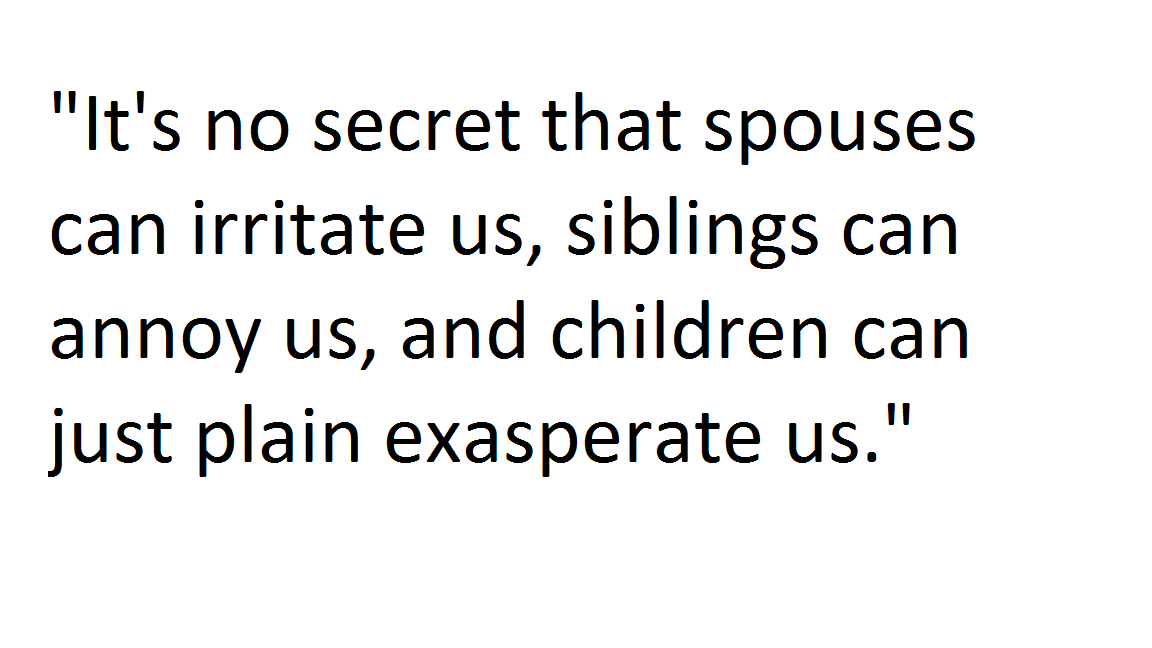 It’s no secret that spouses can irritate us, siblings can annoy us, and children can just plain exasperate us. It’s meekness that keeps us from snapping back angrily with unkind words or actions. As with many virtues, we learn it by doing it—so the very family members who most try us also give us some of the best opportunities to learn how to be meek.
It’s no secret that spouses can irritate us, siblings can annoy us, and children can just plain exasperate us. It’s meekness that keeps us from snapping back angrily with unkind words or actions. As with many virtues, we learn it by doing it—so the very family members who most try us also give us some of the best opportunities to learn how to be meek.
Husbands and wives can live with this meekness towards each other too: difficult though this may sometimes be, ultimately this virtue helps in living out what the real meaning of marriage calls for: giving of oneself.
Of course, giving of oneself is at the very heart of marriage and is in fact indispensable to it: marriage is a total gift of self of a man to a woman and a woman to a man. By its very nature, love is fruitful; the total gift of self that should pervade the whole of a marriage is given expression in the conjugal act, which alone is able to bring forth the fruit of a new life—a sexual act between two men or two women is not able to bring forth this fruit, so a total gift of self cannot be given. (This is also one of the main reasons that we are called to refrain from using contraception. Contraception is neither open to life nor truly unitive; likewise, sexual acts between two members of the same sex are neither open to life nor truly unitive. Since neither of these is able to involve a total gift of self, neither of these is an adequate expression of the authentic meaning of marriage.)
Returning to meekness, then, the husband and wife who cultivate the virtue of meekness towards each other are thereby enabled to love each other more fully and perfectly. By doing precisely this, they become better able to “lead a life worthy of the calling to which [they] have been called” (Eph 4:1), namely, marital happiness leading at last to eternal beatitude.
* The quote above is taken from Servais Pinckaers, O.P., The Pursuit of Happiness—God’s Way: Living the Beatitudes, trans. Sr. Mary Thomas Noble, O.P. (Eugene: Wipf and Stock Publishers, 2011), 61.
~
This series is a guest contribution by a Dominican student brother who has been fulfilling his pastoral ministry assignment by serving as an intern at the USCCB’s Secretariat for Laity, Marriage, Family Life, and Youth.
Archive
The Beatitudes, Marriage, and Family (Part 3 of 9)
Blessed are those who mourn, for they shall be comforted. (Mt 5:4)
God’s mercies are always greater than our troubles. (St. John Chrysostom)
One is almost tempted to think that this promise of comfort somehow doesn’t cut it, doesn’t reach the extent and the weight of the mourning. For when we think of someone mourning, we think of grief, tears, lamentations, deep sorrow. And indeed, some of the greatest sufferings in our lives involve our marriages and families: arguments, illnesses, difficult relationships, and deaths. We not only experience our own sufferings, but often we experience even more intensely the sufferings of our loved ones. In the face of our anguish, what does it even mean to be comforted anyway?
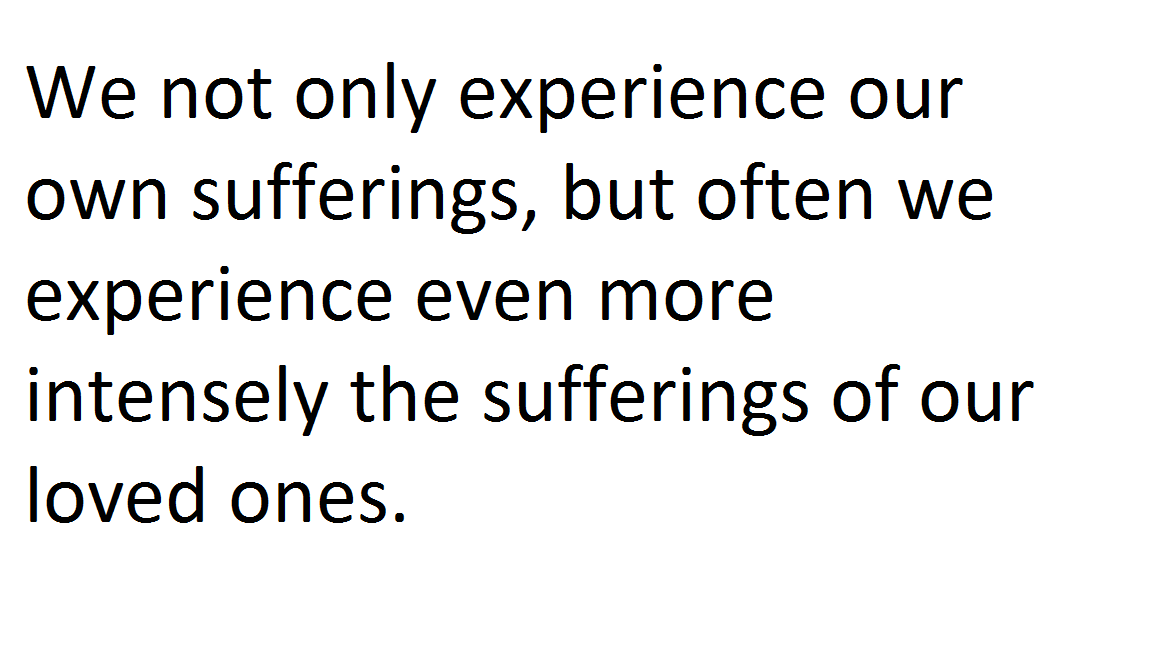 As it happens, Scripture talks about comfort all the time. St. Paul writes: Blessed be the God and Father of our Lord Jesus Christ, the Father of mercies and the God of all comfort, who comforts us in all our afflictions, so that we may be able to comfort those who are in any affliction, with the comfort with which we ourselves are comforted by God (2 Cor 1:3-4); Isaiah writes: Comfort, comfort my people, says your God. Speak tenderly to Jerusalem, and cry to her that her warfare is ended, that her iniquity is pardoned, that she has received from the Lord’s hand double for all her sins (Is 40:1); St. John writes: And I will pray the Father, and he will give you another Counselor, to be with you for ever, even the Spirit of truth, whom the world cannot receive, because it neither sees him nor knows him; you know him, for he dwells with you, and will be in you (Jn 14:16).
As it happens, Scripture talks about comfort all the time. St. Paul writes: Blessed be the God and Father of our Lord Jesus Christ, the Father of mercies and the God of all comfort, who comforts us in all our afflictions, so that we may be able to comfort those who are in any affliction, with the comfort with which we ourselves are comforted by God (2 Cor 1:3-4); Isaiah writes: Comfort, comfort my people, says your God. Speak tenderly to Jerusalem, and cry to her that her warfare is ended, that her iniquity is pardoned, that she has received from the Lord’s hand double for all her sins (Is 40:1); St. John writes: And I will pray the Father, and he will give you another Counselor, to be with you for ever, even the Spirit of truth, whom the world cannot receive, because it neither sees him nor knows him; you know him, for he dwells with you, and will be in you (Jn 14:16).
The word “Counselor” in John’s Gospel may also be translated “Advocate,” “Helper,” “Paraclete” (which is simply the Englishification, if you will, of the Greek word), or even “Comforter.” At any rate, in each of these passages it’s the same word (parakaleō) being used over and over again.
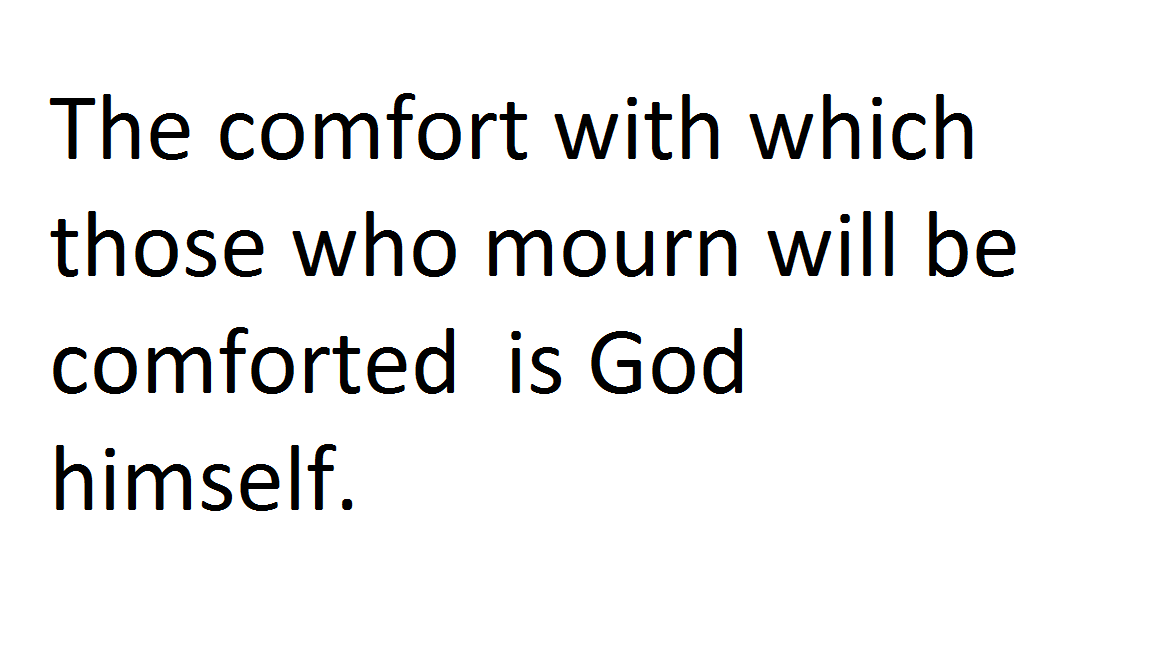 But let’s look a little closer: in 2 Corinthians, the comfort is said to come from the Father, who is “the God of all comfort”; in Isaiah, the coming comfort is the Incarnation, when the very Word of God takes human flesh to redeem us—it is Christ who brings the comfort of redemption to a people afflicted by sin (here the word almost seems too weak!); and in John’s Gospel, the Holy Spirit is the great Comforter who comes to dwell within us. It is therefore not at all a stretch to say that the comfort with which those who mourn will be comforted is God himself.
But let’s look a little closer: in 2 Corinthians, the comfort is said to come from the Father, who is “the God of all comfort”; in Isaiah, the coming comfort is the Incarnation, when the very Word of God takes human flesh to redeem us—it is Christ who brings the comfort of redemption to a people afflicted by sin (here the word almost seems too weak!); and in John’s Gospel, the Holy Spirit is the great Comforter who comes to dwell within us. It is therefore not at all a stretch to say that the comfort with which those who mourn will be comforted is God himself.
This is good news for marriages and families. It’s already been mentioned that some of life’s greatest mourning happens in our married and/or family life, but sometimes spouses and families seem incapable of adequately consoling our sorrow. But we learn from Scripture that those who mourn are comforted with the very life of the Trinity, a comfort that reaches to the deepest depths of our being and raises us up to the heights of beatitude.
~
This series is a guest contribution by a Dominican student brother who has been fulfilling his pastoral ministry assignment by serving as an intern at the USCCB’s Secretariat for Laity, Marriage, Family Life, and Youth.
Archive
The Beatitudes, Marriage, and Family (Part 2 of 9)
Blessed are the poor in spirit, for theirs is the kingdom of heaven. (Mt 5:3)
The proud seek an earthly kingdom, of the humble only is the kingdom of Heaven. (St. Augustine)
This first Beatitude is for the “poor in spirit,” to whom the kingdom of heaven belongs. St. Augustine says that the kingdom of heaven belongs only to the humble. So there must be some connection between poverty of spirit and humility; the two are bound together.
So just what does it mean to be poor in spirit? Notice that Christ connects poverty with a kingdom—an unusual juxtaposition! We do not often think of the poor man as someone who owns a kingdom. But here Christ speaks of a poverty that is spiritual, not material, and a kingdom that is heavenly, not earthly. Poverty always involves some lack. In the course of our lives, it can take a great number of forms, each involving a lack of some kind: suffering, loneliness, old age, illness, etc.
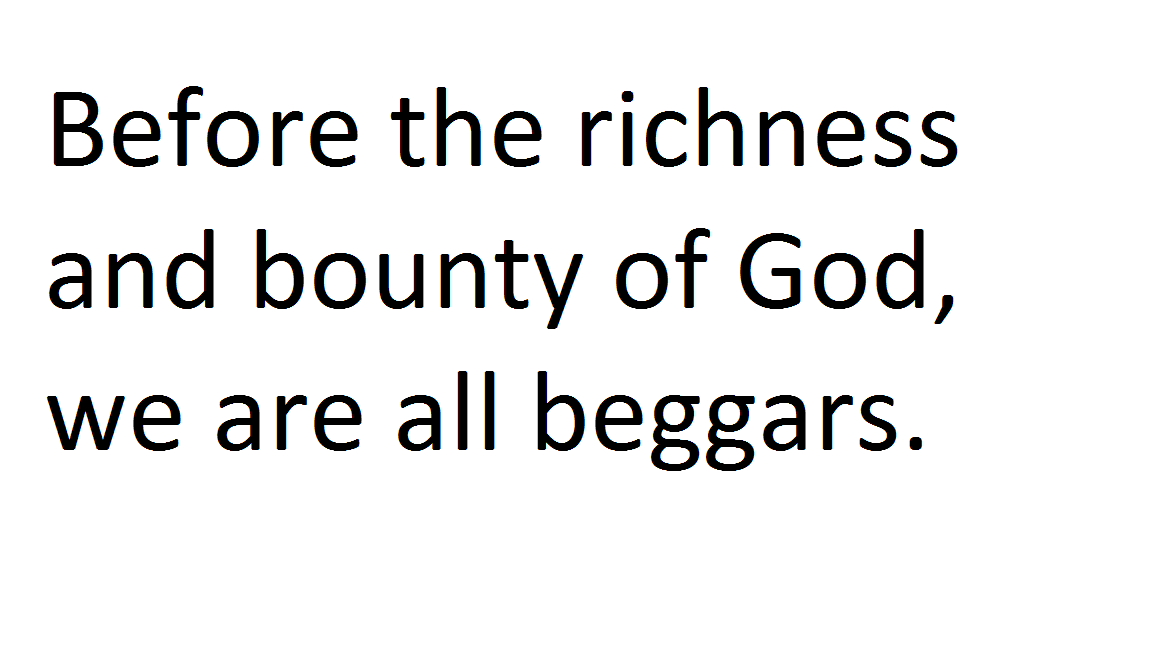 But everyone deals with these things—so is everyone poor? Well, in some way, yes. But spiritual poverty is a particular kind of poverty, in which we all share by our nature: before the richness and bounty of God, we are all beggars. Here we can make sense of St. Augustine’s comment on humility. The man who is truly poor in spirit recognizes his lowliness and poverty before God, and this is humility. It has been said that true humility is not excessive self-abasement but seeing things as they really are. The ability to see one’s own poverty before God is no exception.
But everyone deals with these things—so is everyone poor? Well, in some way, yes. But spiritual poverty is a particular kind of poverty, in which we all share by our nature: before the richness and bounty of God, we are all beggars. Here we can make sense of St. Augustine’s comment on humility. The man who is truly poor in spirit recognizes his lowliness and poverty before God, and this is humility. It has been said that true humility is not excessive self-abasement but seeing things as they really are. The ability to see one’s own poverty before God is no exception.
Pope Emeritus Benedict XVI recently said that everyone who calls himself Christian must be “the last in the opinion of the world.” What could be poorer or humbler than this? We Christians are called to humility and poverty of spirit, virtues which have always been met with opposition and animosity from the world (it’s no secret that the world generally tends to look down on the poor). We who uphold the truth about marriage—namely, that it can only be a union of one man and one woman—frequently experience this opposition and animosity. In this way we can see that there is a certain poverty about defending truth, because we do not defend a truth that comes from ourselves, and a certain humility about defending truth, because it requires us to see things as they really are.
What of family? How can we live a poverty of spirit in our family lives? As I mentioned, the various lacks in our lives indicate our poverty—but spiritual poverty is a special kind of lack. The man who is poor in spirit, recognizing his status as a beggar before God, offers his entire self to God for God’s sake. In both marriage and family life, this involves an offering of self. By spending ourselves for our spouses and family members out of charity, we offer ourselves also to God, the author of marriage and family. In this way we become poor and humble, and better prepare ourselves to receive the gift God most wants to give us: himself.
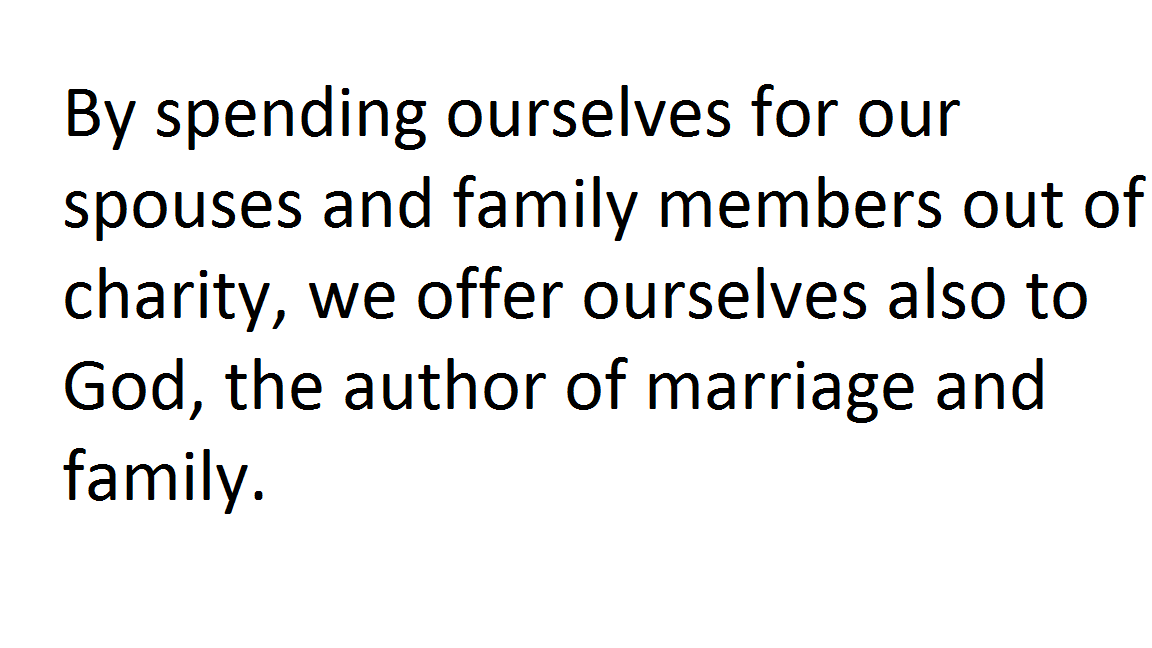 This notion of self-gift, both ours and God’s, is worth exploring further. We speak of Christ as the true Bridegroom and of the Church as his Bride—this goes all the way back to St. Paul’s beautiful and theologically rich words about marriage in the letter to the Ephesians (5:21-33). St. Paul himself says that the union between husband and wife and its relation to the union between Christ and the Church is a great mystery: “great,” not just in the sense of “difficult to understand,” but in the sense of “awe-inspiring” and even “life-giving”—the only other place St. Paul talks about a “great mystery” is in reference to the Incarnation, when God himself came among us as a man (cf. 1 Tim 3:16). So it’s striking that he speaks of the great mystery of Christ’s union with the Church in almost the same breath as the union between husband and wife. Indeed, not only does the union of marriage through self-gift serve as an image of the union of Christ with the Church through his perfect self-gift; marriage is given to mankind as a means for husband and wife to participate in this union with our Lord: marriage raises us to God.
This notion of self-gift, both ours and God’s, is worth exploring further. We speak of Christ as the true Bridegroom and of the Church as his Bride—this goes all the way back to St. Paul’s beautiful and theologically rich words about marriage in the letter to the Ephesians (5:21-33). St. Paul himself says that the union between husband and wife and its relation to the union between Christ and the Church is a great mystery: “great,” not just in the sense of “difficult to understand,” but in the sense of “awe-inspiring” and even “life-giving”—the only other place St. Paul talks about a “great mystery” is in reference to the Incarnation, when God himself came among us as a man (cf. 1 Tim 3:16). So it’s striking that he speaks of the great mystery of Christ’s union with the Church in almost the same breath as the union between husband and wife. Indeed, not only does the union of marriage through self-gift serve as an image of the union of Christ with the Church through his perfect self-gift; marriage is given to mankind as a means for husband and wife to participate in this union with our Lord: marriage raises us to God.
~
This series is a guest contribution by a Dominican student brother who has been fulfilling his pastoral ministry assignment by serving as an intern at the USCCB’s Secretariat for Laity, Marriage, Family Life, and Youth.
Archive
The Beatitudes, Marriage, and Family (Part 1 of 9)
Seeing the crowds, he went up on the mountain, and when he sat down his disciples came to him. And he opened his mouth and taught them, saying: . . .
(Mt 5:1-2)
Whoever will take the trouble to examine with a pious and sober spirit, will find in this sermon a perfect code of the Christian life as far as relates to the conduct of daily life. (St. Augustine)
The Beatitudes are the beginning of the first recorded public preaching of Jesus in Matthew’s Gospel. Just a few verses before this, we read about how Jesus began his ministry: he heard that John was arrested, left Nazareth and went to live in Capernaum in Galilee, and there began to preach. After calling the first disciples, he went about all Galilee, teaching in their synagogues and preaching the gospel of the kingdom and healing every disease and every infirmity among the people. So his fame spread throughout all Syria, and they brought him all the sick, those afflicted with various diseases and pains, demoniacs, epileptics, and paralytics, and he healed them (4:23-24). The crowds were there because they had heard Jesus’ preaching, they had seen his ability to heal diseases and infirmities, and they wanted more, they yearned for more.
Their longing for him did not go unnoticed; upon seeing them, he went up on the mountain, sat down, opened his mouth, and taught them. St. Remigius of Auxerre (d. 908) tells us that “[w]herever it is said that the Lord opened His mouth, we may know how great things are to follow.” Great things, indeed—the Beatitudes are among the most sublime teachings of our Lord. As St. Augustine (d. 430) said, “Whoever will take the trouble to examine with a pious and sober spirit, will find in this sermon a perfect code of the Christian life as far as relates to the conduct of daily life.”
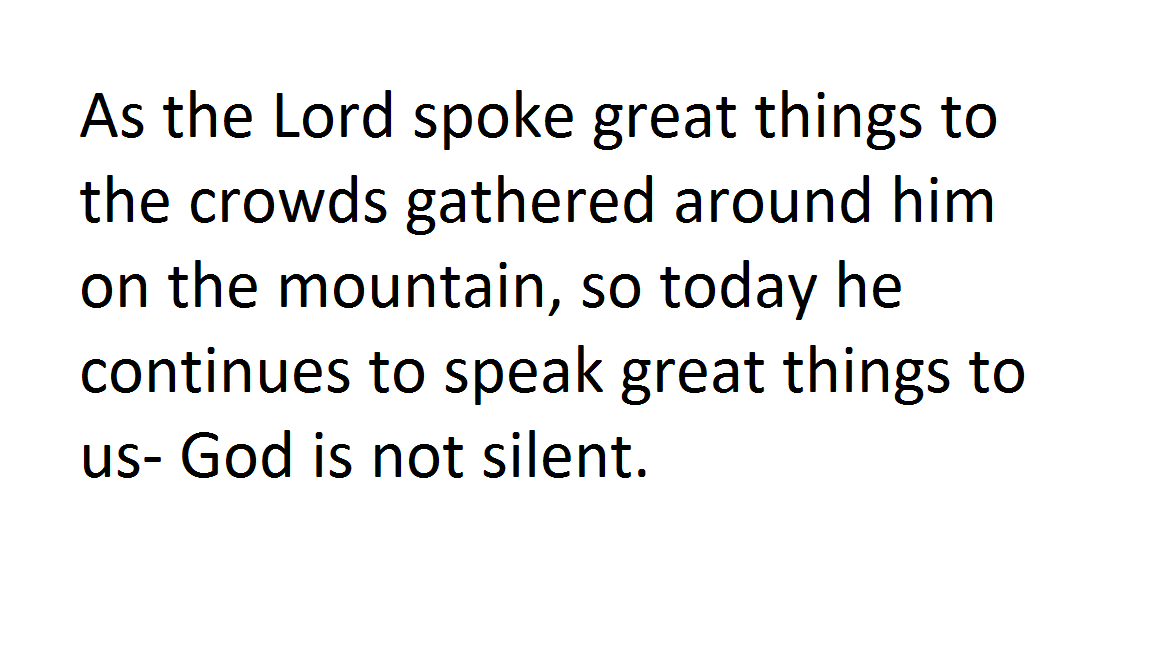 As the Lord spoke great things to the crowds gathered around him on the mountain, so today he continues to speak great things to us—God is not silent. The Word, spoken forth from all eternity (cf. Jn 1), speaks to the hearts of men. The Psalms are full of this beautiful image of the Lord speaking to our hearts: I will hear what the Lord God speaks; / he speaks of peace for his people and his faithful / and those who turn their hearts to him (Ps 85:9). When he speaks, he reveals himself to man—and he reveals man to himself (cf. Gaudium et Spes 22).
As the Lord spoke great things to the crowds gathered around him on the mountain, so today he continues to speak great things to us—God is not silent. The Word, spoken forth from all eternity (cf. Jn 1), speaks to the hearts of men. The Psalms are full of this beautiful image of the Lord speaking to our hearts: I will hear what the Lord God speaks; / he speaks of peace for his people and his faithful / and those who turn their hearts to him (Ps 85:9). When he speaks, he reveals himself to man—and he reveals man to himself (cf. Gaudium et Spes 22).
We learn who we are as adopted sons of God (cf. 1 John 3:1-2)—sons and daughters in the Son—when this divine voice speaks to our hearts, when we hear his Word, who is Christ, the revelation of the Father. God, who adopts us to be his own children, is the same God who made us, created us—and he created us male and female. This shouldn’t be overlooked: it is significant for who man is that he was created in this way, because God’s actions are never meaningless.
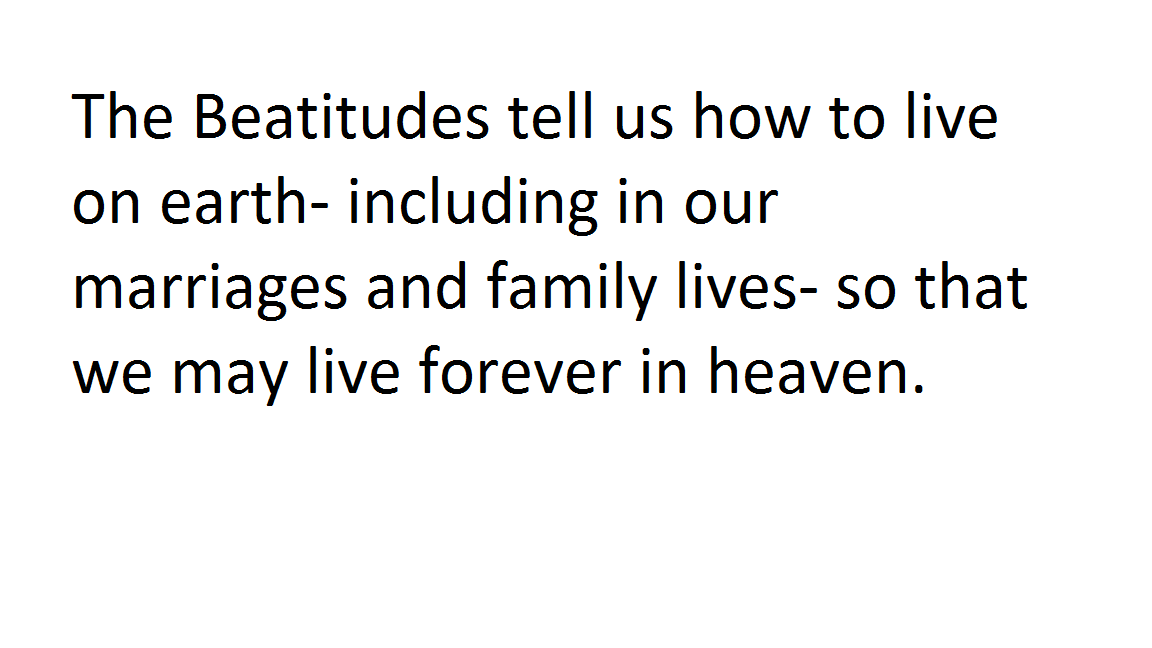 But can the Beatitudes really teach us something about having been created male and female, about marriage, about our conjugal relationships? Why, yes they can: for as St. Augustine (d. 428) says, we “find in this sermon a perfect code of the Christian life as far as relates to the conduct of daily life.” Indeed, Pope Francis has spoken about this several times, pointing out that in “proclaiming the Beatitudes, Jesus asks us to follow him and to travel with him along the path of love, the path that alone leads to eternal life”; he has also made the Beatitudes the theme for World Youth Day 2014-16. The Beatitudes tell us how to live on earth—including in our marriages and family lives—so that we may live forever in heaven. (In fact, one way we can see this connection is by noticing that the Beatitudes are one of the options for the Gospel reading in the Rite of Marriage, and they are also the Gospel reading for All Saints’ Day, when we celebrate that God is wonderful in his saints.) In this series, then, we will see in the Beatitudes a sure guide for promoting, preserving, and living the authentic meaning of marriage and family, and thus coming closer on earth to the eternal happiness of heaven.
But can the Beatitudes really teach us something about having been created male and female, about marriage, about our conjugal relationships? Why, yes they can: for as St. Augustine (d. 428) says, we “find in this sermon a perfect code of the Christian life as far as relates to the conduct of daily life.” Indeed, Pope Francis has spoken about this several times, pointing out that in “proclaiming the Beatitudes, Jesus asks us to follow him and to travel with him along the path of love, the path that alone leads to eternal life”; he has also made the Beatitudes the theme for World Youth Day 2014-16. The Beatitudes tell us how to live on earth—including in our marriages and family lives—so that we may live forever in heaven. (In fact, one way we can see this connection is by noticing that the Beatitudes are one of the options for the Gospel reading in the Rite of Marriage, and they are also the Gospel reading for All Saints’ Day, when we celebrate that God is wonderful in his saints.) In this series, then, we will see in the Beatitudes a sure guide for promoting, preserving, and living the authentic meaning of marriage and family, and thus coming closer on earth to the eternal happiness of heaven.
~
This series is a guest contribution by a Dominican student brother who has been fulfilling his pastoral ministry assignment by serving as an intern at the USCCB’s Secretariat for Laity, Marriage, Family Life, and Youth.








